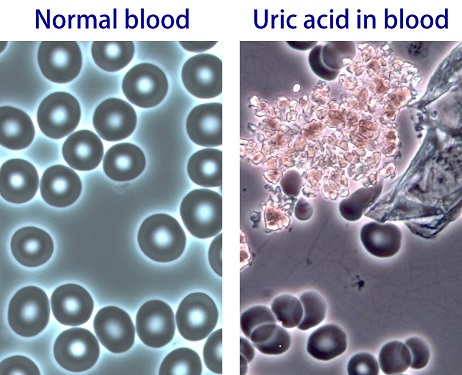As we know, many studies have linked Gout with chronic inflammation and obesity. Both conditions contribute a group of factors that increase the risks of heart disease, stroke, and diabetes – also known as metabolic syndrome. Metabolic syndrome is a cluster of biochemical and physiological abnormalities affecting an estimated 50 million Americans.
Continue reading “Gout and Metabolic Disease: Can Probiotics help?”Tag: metabolic syndrome
Understanding Uric Acid
Uric Acid
Purines perform multiple important functions within our cells, including regulating energy metabolism and signaling the energy conversion from one to another. Purines are essentially the building blocks for all living things as a necessity for the growth, proliferation and survival of all cells. The two purine bases, adenine and guanine, create bonds that form the DNA ladder. Humans breakdown purines and convert them into uric acid.
Uric acid happens to be a potent DNA protector. All other mammals possess an enzyme known as uricase. Uricase converts uric acid into allantoin, which can easily travel through the bloodstream and readily eliminated through the urine. Humans do not possess this enzyme, therefore, we cannot oxidize uric acid into the more soluble compound of allantoin. Our liver and kidneys are left to do the all-important jobs of purine breakdown and uric acid disposal, conducted respectively.
Continue reading “Understanding Uric Acid”Fructose and Uric Acid Metabolism

Sugar intake has risen dramatically over the last century which seems to correlate closely with the rise in obesity, diabetes, and metabolic syndrome. Simple sugars include both glucose and fructose. While glucose is generally utilized by the body for energy production, fructose is known to produce high amounts of harmful substances. Added sugars to our food sources mostly stem from fructose, and fructose metabolism can cause some pretty significant damage. Fructose can actually deplete our energy sources, cause death to our cells, stimulate fat making enzymes, and produce excess uric acid.
Studies on rats have shown fructose intake to instigate all markers of metabolic syndrome – increased waistline, obesity, diabetes, hypertension, non-alcoholic fatty liver disease, lipid abnormalities, dementia, cardiovascular disease, and cancer. These studies have also shown high fructose intake to stimulate free radicals, weaken the arteries, create a fatty liver, and cause kidney damage. Continue reading “Fructose and Uric Acid Metabolism”

